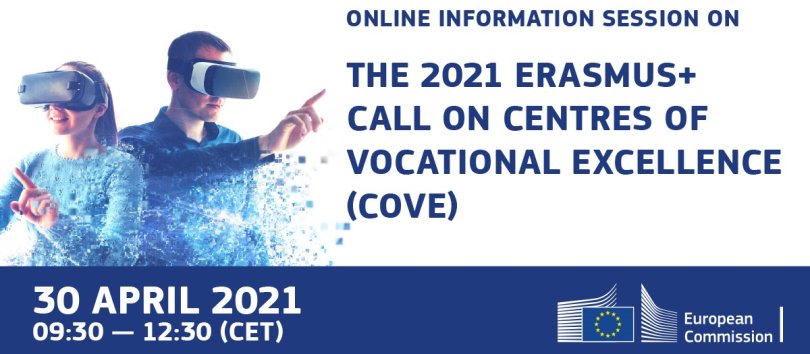
New EU multi-million Euro grants set to boost excellence in vocational education and training
A new EU grant worth €400 million over the next 7 years is set to boost partnerships of excellence in the world of vocational education and training [VET].
The Erasmus + programme Partnerships for Excellence - Centres of Vocational Excellence grant has €44 million available this year for partnerships involving training institutions, regional development organisations, companies and other stakeholders.
The programme - which has been piloted over the past two years with great success - includes three new aspects: partners from countries worldwide can be included in applications - providing the core partners are EU based Erasmus + members; a lump sum grant of up to €4 million is available to cover 80% of financing for eligible projects; and funding is divided between "work packages" - which means that if one sub-section of an application fails eventually to meet criteria and has funding withdrawn or reduced it will not affect others parts of a CoVE partnership grant.
Introducing the new grants at an EU osenline event Friday - for which consortiums of Centres of Vocational Excellence (CoVEs) may apply for by a September 7, 2021 deadline - Nicolas Schmit, the EC's Commissioner for Jobs and Social Rights, said the funding was available, the political will was there to address the need for a more innovative approach to developing the skills needed for the future, and all that was needed was the commitment and cooperation of people and organisations committed to excellence in skills training to apply with imaginative and innovative projects.
Focusing on the EU's agenda for addressing climate change within economic development, Mr Schmit added: "We need workers who can install heat pumps, who know how to safely dispose of the batteries we shall all increasingly use in our cars... but beyond funding and politics this depends on us all working together to promote skills for the future to address new economic needs, new digital skills and retraining, reskilling and upskilling."
The three-hour long presentation included general guidelines for partner organisations wishing to apply for the programme funding, along with examples of CoVE partnerships that had already received funding over the past two years.
A detailed presentation on precisely how to access the grant application form, with step-by-step advice on how to fill it in - and the recommendation that partnerships don't leave things until the last minute - can be seen in the last 45 minutes of the video of the event.
Introducing the new lump sum grants and conditions, Joao Santos, of the DG Employment, said the new long-term commitment to funding CoVEs - and the inclusion of international partners - was part of the EU's focus on emphasising the key importance of skills training with labour market significance in addressing targets for a sustainable economic future.
Applicants for funding should bear in mind three key success factors for CoVEs, he said: strong and enduring partnerships, projects anchored in regional or national development strategies, and integrated activities that reach out beyond simply delivering qualifications to addressing individual and societal needs.
Applications from partnerships - which must include at least 8 full partners, including 4 Erasmus+ full members ) with at least two from EU members states), and at least one business or enterprise and 1 VET school from an Erasmus+ programme country - would need to include certain key activities in their pitch for funding: teaching and learning, cooperation and partnerships, and governance and finance.
Capacity building, international strategies that facilitate learner mobility and anticipation of future skills needs will also attract points in the funding application.
"What we want ultimately is that vocational centres at the local level deliver what is best for the region, but learn from others and have partnerships from far reaching and different areas," Mr Santos said.
"CoVEs for regional development working in cooperation means that all participants benefit, learning from each other."
Examples from networks that support CoVEs - including the European Training Foundation's own ENE Network for Excellence - and existing CoVE partnerships, such as Denmark's European Platform for Urban Greening, which recently launched a biodiversity course that includes units for primary school teaching - gave the 1,000 viewers of the online event a clear idea of the sort of partnerships that will be funded.
Detailed instructions for applying for grants were presented towards the end of the online presentation, with key tips that included the weighting given to key qualifying sections such as quality assessment, project design and implementation, consortium arrangements and impact.
Other requirements such as applying for specific 4 year projects that will be ready to start operations by the beginning of May or June 2022, and the need to appoint a lead legal officials responsible for signing contracts and overseeing the financial management of projects were explained alongside essential advice such as: "Section B of the application is the heart of the process; the Erasmus+ guide the bible to the process."
With just €44 million available this year - sufficient for around 11 partnership projects (potentially including some 80 or 90 partners) - competition will be tough, but as Chiara Riondino, Head of Unit for VET DG Employment, remarked in concluding comments: "The ball is in your court now…. in the last round we received really very high quality projects in green skills, IT, the social dimension and even focusing on traditional sectors with a new spin, such as furniture and fishing.
"We have high expectations and are very excited and can't wait to look at your ideas and be inspired and start another leg of the journey."
Did you like this article? If you would like to be notified when new content like this is published, subscribe to receive our email alerts.